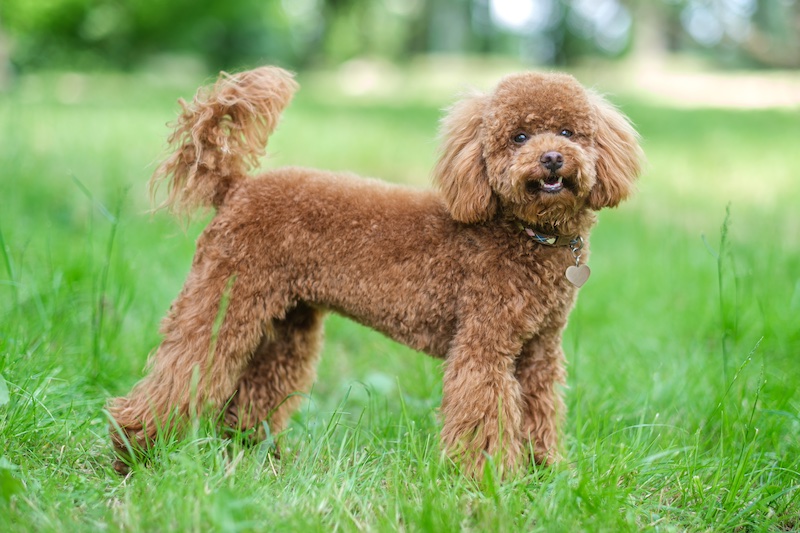If you’ve recently retired, suddenly found yourself with an empty nest, or are simply seeking some companionship, you might be thinking about getting a furry friend to fill your cup.
To help with your search, we’ve compiled a list of some of the best dog breeds for older adults, stuffed with expert insights from Lemonade’s favorite vet, Dr. Stephanie Liff.
Read on to find the perfect breed for you or your loved one!
1. Shih Tzu

The Shih Tzu is a small, regal breed, known for its flowing mane and sweet, expressive eyes. Affectionate and adaptable, these pups enjoy the company of people and other canines, but also make great solo companions. Shih Tzus are low-shedding and hypoallergenic, although they do need a brush and coat trim now and then.
General info:
- Height: 9 to 10.5 inches
- Weight: 9 to 16 pounds
- Coat color: Wide ranging, including any combo of white, black, gray, and brown
- Coat texture: Long, dense, and flowing
- Activity level: Low to moderate
- Lifespan: 10 to 16 years
- Potential health concerns: Breathing problems (due, unfortunately, to their adorable button noses) as well as certain eye, skin, and dental conditions
2. Poodle

Poodles come in three sizes (toy, miniature, and standard), allowing you to choose the stature that suits your living situation. Known for their intelligence and elegance, Poodles have curly, hypoallergenic coats that shed minimally and require regular grooming to stay mat- and tangle-free.
Poodles love walks and interactive play, but their exercise needs can vary depending on size. Toy Poodles only need short daily walks, but Standards can be high-energy and more prone to pulling on their leashes—so you’ll want to pick your Poodle based on your desired level of activity and commitment to training.
General info:
- Height: Toy: under 10 inches, Miniature: 10 to 15 inches, Standard: 15+ inches
- Weight: Toy: 4 to 6 pounds, Miniature: 10 to 15 pounds, Standard: 45 to 70 pounds
- Coat color: Wide ranging, including white, black, apricot, silver, among other colors
- Coat texture: Curly, dense, and hypoallergenic
- Activity level: Moderate to high for Toys and Miniatures; high for Standards
- Lifespan: 10 to 18 years
- Potential health concerns: Eye problems, skin conditions, and joint issues
3. Cockapoo

A mix between a Cocker Spaniel and a Poodle, Dr. Liff recommends Cockapoos for seniors because of their friendly and affectionate demeanor. Cockapoos thrive in plenty of different environments, making them great for any type of home—whether it be assisted living or the split level you’ve lived in for the last 30 years. Their low-shedding coats do tend to require regular upkeep.
General info:
- Height: Typically 10 to 15 inches
- Weight: Generally 12 to 24 pounds
- Coat color: Wide ranging, including black, white, cream, red, among other colors
- Coat texture: Can vary from straight to curly; low-shedding and often considered hypoallergenic
- Activity level: Moderate to high
- Lifespan: 12 to 15 years
- Potential health concerns: Hip dysplasia, patellar luxation, progressive retinal atrophy (PRA) and other eye conditions, ear infections, allergies, liver disease, and heart disease
4. Yorkshire Terrier

Yorkshire Terriers (aka, Yorkies) are tiny but mighty, with bold personalities packed into petite frames. Their long, silky coats are striking—though they do need regular visits to the groomer to stay in top condition. Yorkies also make surprisingly committed watch dogs and can be prone to yapping when in need of exercise.
General info:
- Height: 7 to 8 inches
- Weight: 4 to 7 pounds
- Coat color: Various combos, including blue and tan, blue and gold, black and gold, black and tan
- Coat texture: Fine, silky, and straight
- Activity level: Moderate
- Lifespan: 11 to 15 years
- Potential health concerns: Dental problems, patellar luxation, and heart conditions
5. Pembroke Welsh Corgi

Corgis are known for their long but low-to-the-ground bodies, perky ears, and spirited personalities. Intelligent and affectionate, they make great companions for anyone who enjoys a bit of spunk. Corgis are also relatively low-maintenance dogs, although they do tend to require more daily exercise than other senior-friendly breeds. Regular grooming can help manage their moderate shedding.
General info:
- Height: 10 to 12 inches
- Weight: 25 to 30 pounds
- Coat color: Various combos of red, sable, fawn, black, and tan, with or without white markings
- Coat texture: Medium length, with a thick undercoat and a coarser outer coat
- Activity level: High
- Lifespan: 12 to 15 years
- Potential health concerns: Hip dysplasia, degenerative myelopathy, intervertebral disc disease, obesity, and eye issues like progressive retinal atrophy
6. Chihuahua

Like the Yorkie, the Chihuahua is a tiny dog with a big personality. Chihuahuas are fiercely loyal and make excellent companions for anyone in need of a devoted lap dog. Grooming needs are pretty minimal for short-haired varieties, although longer-haired Chihuahuas may require more regular brushing.
General info:
- Height: 6 to 9 inches
- Weight: 2 to 6 pounds
- Coat color: Wide ranging, including black, white, fawn, and chocolate, among other possibilities
- Coat texture: Can be smooth or long-haired
- Activity level: Moderate
- Lifespan: 12 to 20 years
- Potential health concerns: Patellar luxation, tracheal collapse, hypoglycemia, periodontal issues, heart problems, hydrocephalus, obesity, and eye problems
7. Havanese

Small and sturdy, Havanese dogs are known to be playful and affectionate companion dogs. They’re great for anyone looking for a loving, loyal, and low-maintenance bestie. Havanese dogs only need light exercise, but their long, silky coats do require some regular grooming to prevent matting.
General info:
- Height: 8.5 to 11.5 inches
- Weight: 7 to 13 pounds
- Coat color: Wide ranging, including white, black, silver, and chocolate, among other variations
- Coat texture: Long, soft, and silky
- Activity level: Moderate
- Lifespan: 14 to 16 years
- Potential health concerns: Hip dysplasia, patellar luxation, cataracts, heart murmurs, allergies, Legg-Calvé-Perthes disease, deafness
8. Schnauzer

Like Poodles, Schnauzers also come in three sizes—in this case, miniature, standard, and giant. As their distinguished beards and bristling eyebrows suggest, Schnauzers are intelligent, alert, and protective dogs.
All Schnauzers, regardless of size, tend to be pretty playful and energetic, so they’re probably best suited to more active seniors. Their wiry coats will also require some regular grooming to keep neat.
General info:
- Height: Miniature: 12 to 14 inches, Standard: 17 to 20 inches, Giant: 23 to 28 inches
- Weight: Miniature: 11 to 20 pounds, Standard: 30 to 50 pounds, Giant: 55 to 85 pounds
- Coat color: Black, salt and pepper, black and silver, white
- Coat texture: Wiry and dense with a soft undercoat
- Activity level: High for Miniatures and Standards; very high for Giants
- Lifespan: Miniature: 12 to 15 years, Standard: 13 to 16 years, Giant: 12 to 15 years
- Potential health concerns: Hip dysplasia, pancreatitis, urinary stones, cataracts, progressive retinal atrophy, myotonia congenita, von Willebrand’s disease
9. Mixed Breed

As adorable as many of these senior-friendly breeds are, you may also want to consider adopting a mixed-breed dog (aka, mutt). In addition to giving a sweet cutie a loving home, adopting a mixed-breed dog can translate to fewer health issues (and lower vet bills) down the line. Because of their more diverse genetic makeup, they tend to be less susceptible to many of the health issues that plague their purebred peers.
Plus, opting for a mixed breed means a greater variety of shapes and sizes to choose from. Whether you’re looking for a small, low-energy couch potato to cuddle with or a large hype pet to help you close your daily rings, there’s nearly always a mixed-breed pup that fits the bill.
Many mixed-breed dogs can be found through reputable shelters and rescue organizations. Not to mention, mixed-breed pups often come with some training already, which can make them ideal for seniors looking to spare themselves the energy suck of training a puppy.
What characteristics are most suitable for seniors looking for a dog?
The best pups for seniors tend to be non-shedding dogs under 30 pounds with lower or more moderate energy levels, according to Dr. Liff.
Small dogs tend to require less exercise and also make for ideal apartment pups if you’ve recently down-sized. Plus, they’re typically more transportable in case you plan to include your pup in your post-retirement travel plans.
Smaller breeds can, however, be more prone to yapping and barking—which you may want to keep in mind if you live in an apartment where you share walls with other people.
But, even if you think you’ve found the breed that ticks all the boxes, keep in mind that every individual pooch is unique and can’t be 100% defined by their breed.
What breeds are less suitable for seniors?
High-energy breeds that require extensive exercise and physical activity can be more challenging for seniors who might have limited mobility or lower energy levels.
Very large dogs such as Great Danes, Saint Bernards, or Mastiffs are less ideal because, as Dr. Liff cautions, larger dogs can be a bit tougher to physically manage—especially if they need extra help during an illness or after a procedure.
Because of their high energy levels and intense exercise needs, Huskies, Heelers, certain hounds, and herding breeds like Australian Shepherds and Border Collies may also be less advisable (unless, perhaps, the Border Collie in question is the gentle, scene-stealing pooch from Anatomy of a Fall).
Adopting an adult dog
While you’re already considering adopting instead of shopping, why not opt for an older pooch?
According to Dr. Liff, older dogs can make wonderful companions for older owners because they tend to come with more training and more established behavioral histories:
I think the best way for seniors to obtain a pet is through adoption where they may be able to get an older, housebroken, and possibly trained pet. Also, many adoptable pets have a history that allows the adopter to know what their prior lifestyle was and if they can be around grandkids or other pets.
But, if you’re still on the fence about adopting an adult dog, you can always start by fostering first to see if a particular pup is a good fit. Dr. Liff points out that older or retired pet owners can be uniquely well-suited to fostering because they often have more time at home to help their foster adapt to them and their new surroundings.
Before we go…
Your best years are just getting started, and adding a pooch to the mix can make them all the sweeter.
Once you find your new furry companion, check out how pet insurance for dogs can take a bite out of vet bills.
At Lemonade, a base policy can help cover the costs of diagnostics (like x-rays or blood tests) and treatments (like surgery or medication) for eligible accidents and illnesses. But you have the power to customize your dog’s policy with preventative care and add-on coverages to meet their needs—and your budget.
Choosing the right dog breed takes time, but you can sign up for Lemonade pet insurance in seconds. Click below to get your quote started.
A few quick words, because we <3 our lawyers: This post is general in nature, and any statement in it doesn’t alter the terms, conditions, exclusions, or limitations of policies issued by Lemonade, which differ according to your state of residence. You’re encouraged to discuss your specific circumstances with your own professional advisors. The purpose of this post is merely to provide you with info and insights you can use to make such discussions more productive! Naturally, all comments by, or references to, third parties represent their own views, and Lemonade assumes no responsibility for them. Coverage and discounts may not be available in all states.




